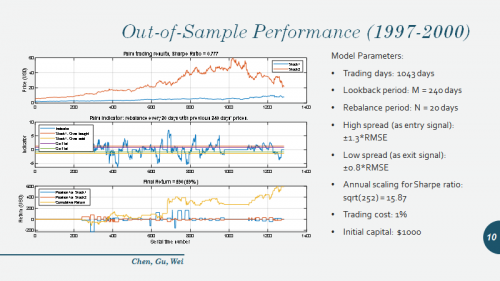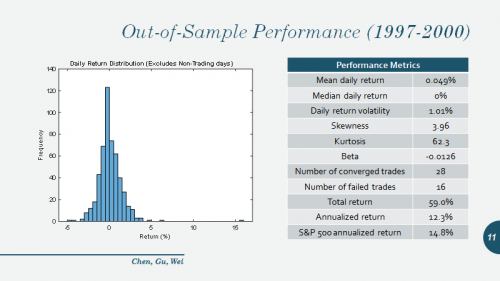PRMIA Risk Management Challenge 2020: Going Virtual in a RISKY Challenge
Today’s guest blogger is John Elhilow, who’s here to share the results of the 2020 PRMIA Risk Management Challenge and to encourage University students to participate in the 2021 challenge! Learn more about the competition here, where participating Teams can also apply for complimentary software.
Going Virtual in a RISKY Challenge
For many students, a successful transition from school to their chosen career depends on their ability to take what they’ve learned from their coursework and apply it to real-life situations. The Professional Risk Managers’ International Association (PRMIA) believes this is such a vital skill, they have created an internationally renowned Risk Management Challenge based on applying risk management theory to the workplace. The Challenge gives risk and finance students the experience of using critical thinking and problem-solving skills around a real-life case study. Current undergraduate and graduate students from universities around the world form teams of three or four to compete in the Challenge’s three rounds of competition.
Due to disruptions caused by COVID-19, in 2020, the Risk Management Challenge had to be modified for its regional and final rounds. As teams and chapters faced challenges with traveling and hosting in-person events, PRMIA decided to follow the competition through to the end and host the events virtually. Some chapters hosted their regional competitions on Zoom or Google Meet, while others had participants submit pre-recorded video presentations that were judged offline.
Over the course of several months, in-person and online, the PRMIA Risk Management Challenge used a real-life simulation to give its student participants practical experience and an edge in job interviews and real-life employment. It will also help develop future leaders in the risk industry. The final round on April 20, 2020, was hosted entirely on Zoom, with team presentations in the morning followed by career panel discussions, finalist presentations, and the announcement of the winning team in the afternoon.
The above excerpt regarding the 2020 PRMIA Risk Management Challenge reprinted with permission of Association North, previously featured in the May/June 2020 issue of Focus North.
Highlights of the 2020 PRMIA Risk Management Challenge can be viewed below:
The Virtual MATLAB Challenge
As part of the PRMIA Risk Management Challenge, teams were also provided with the opportunity to compete in a MATLAB Challenge. The MATLAB Challenge was selected to complement the Long-Term Capital Management (LTCM) case with a hands-on application of pairs trading. The MATLAB product team provided students with a reference example of developing a trading strategy between Brent Crude Oil and West Texas Intermediate using cointegration as the measure for how the two oil prices changed in relationship to each other over time. This reference example provided the recipe for students to understand how to program and apply the trading strategy within MATLAB in the short time frame they had to compete.
The real part of the challenge for the competition teams was to develop their own pairs trading strategy by selecting stocks from the constituents of S&P500 index. Students were free to develop a single pairs trading strategy or a portfolio of pairs trading strategies using cointegration or any other measure they chose, such as correlation in any tool of their choice (MATLAB, R, Python, and Excel were used by different teams).
Evaluation of their solution was based upon a written document or a presentation document describing their rationale for selection of the trading strategy along with in and out of sample backtested performance with risk measures of their choosing. They were also tasked with assessing the market and liquidity risk their strategy was exposed to and how their strategy was similar or different to what LTCM experienced.
Overall, 20 teams participated in the MATLAB Challenge and submitted high-quality challenge solutions. The MATLAB Challenge was also used as a tie-breaker during the regional rounds to select teams for the final round. 12 teams made it to the final round where the MATLAB Challenge winners were scored across dimensions of presentation, analytical rigor, selection of risk measures, and overall trading performance with a maximum score of 100. The top 3 placed teams were:
- 1st Place – Team 9893, Baruch College (100 points)
- 2nd Place – Risky Toronto, University of Toronto (85 points)
- Tie for 3rd Place – Morpheus, Rutgers University, and UNB MQIM-2020, University of New Brunswick (tied at 80 points)
Team 9893 won the challenge with a perfect score. Team 9893 team’s code is on github and images from their presentation are shown below for their back test performance. As can be seen in their presentation slides below, the performance of their strategy had an annualized return of 12.3%.


Watch the Finals of the 2020 PRMIA Risk Management Challenge below:
What the Winners are saying!
We were able to receive insight from students of two of the top Teams in the competition, Team 9893 and Team Morpheus. Read more of their approach to the competition, how they used MATLAB, and their key takeaways from their participation in the PRMIA Risk Management Challenge below:
Team 9893, Baruch College
1st place winners, Team 9893, used MATLAB to simulate their trading strategy, and used teamwork to come out on top in the competition. They approached the challenge questions in a collaborative method, discussing the questions as a Team first before drafting answers to those questions separately, and then the Team came together to finalize their answer. The Team stated that the competition was a good opportunity for them to apply what they’ve learned into solving practical problems in the industry, and that the quantitative skills used in the competition would be helpful for most professional roles that they would pursue.
Team Morpheus, Rutgers University
3rd place winners, Team Morpheus, used MATLAB for financial modelling and numerical analysis, which allowed them to perform matrix computation seamlessly. Also using teamwork to their advantage, the Team divided into roles that were based on their expertise, knowledge areas, technical skills and soft skills. MATLAB helped the Team to perform very intricate codes in an easy way when there were many transformations involved in the computation. The Team stated that the competition was a good opportunity for them to learn about risk analysis and how certain companies’ risk becomes systematic in nature, as well as showed them the importance of having a quanta-mental approach to finance world.
- Category:
- MATLAB,
- Team achievements









Comments
To leave a comment, please click here to sign in to your MathWorks Account or create a new one.